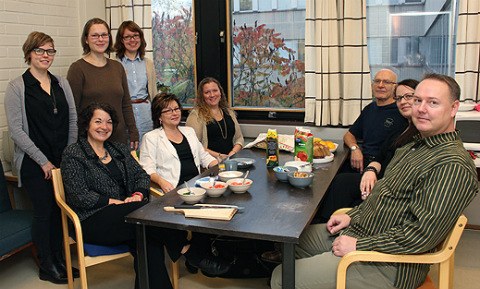We Only Learn to Speak Properly as Adults
The Department of Phonetics and LAB-lab, University of Turku, organized a multidisciplinary symposium that addressed the human ability to learn and adopt.

-You can easily find the coffee room of the Phonetics. Just follow the laughter and loud noises, Docent Maija S. Peltola guides.
The symposium gathered together international experts of speech research and psychology.
Professor Valerie Hazan from the University College London has studied speaker-listener adaptations in communicative speech. According to her primary results teenagers cannot yet master all the nuances of communication.
- Previously, the focus of the research has been in the early years of the speech development. However, it now seems that learning continues way further, Hazan points out.
Hazan argues that people have an amazing ability to adapt their speech in different situations. We do this subconsciously. If we talk to kids or pets, we automatically know how to get their attention. We talk in higher pitch and vary the tempo of the speech. If someone is less proficient in the language, we make your language linguistically simple and use less vocabulary items.
- In one of our research settings, two people discussed together and one of them wore headphones. The other person heard background noises of discussions and the other did not know this. Still, they both modified their speech to be more understandable, Hazan explains.
- We of course want to be understood, but we also want to make the effort as minimal as possible, she continues.
According to Hazan, the capability of adults to make subtle adaptations is quite remarkable. We learn this by observation and by testing which strategies work. In her latest research, teenagers used much more straightforward communication and did not yet manage all the different strategies.
The Nuancec of Finnish
Docent Maija S. Peltola from the Department of Phonetics studies the language learning effects on learners with different backgrounds, e.g. elderly populations, children and immigrants. In LAB-lab, they are also developing optimal training methods for learning to pronounce Finnish.
Peltola and Hazan sum that although there are numerous differences in different languages, there are also common processes.
- International cooperation is very important to us. I am glad to bring together experts that have heard about each other, but have not before properly met. Now, we can start to plan future collaboration projects, Peltola says.
As a result of the symposium, a new international research project focusing on cross-linguistic learning differences was launched.
Plasticity II Symposium was held in the University of Turku on the 16th of October.
Henna Borisoff